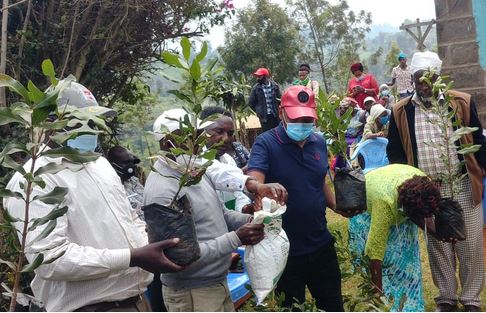Kiambu tea and coffee farmers urged to embrace macadamia

Coffee and tea farmers in Kiambu County are set to make better earnings after embracing the growing of macadamia nuts as part of their commercial agriculture.
The farmers will make monthly incomes from the nuts and won’t have to wait for a year to be paid for their toil after entering into a pact with Thika-based macadamia processing company Jungle Nuts Ltd.
Their willingness to intercrop comes as tea and coffee which, are major cash crops in the area, continued to register a steady decline due to poor returns and mismanagement of the sector.
Even as the government continues to launch programs aimed at shielding growers from exploitation and safeguarding what used to be the country’s top foreign exchange earners, Kiambu farmers believe that Macadamia could be their route out of poverty.
One of the farmers’ leaders, Leah Wanjiru said growing tea and coffee has of late become less profitable, as growers have been posting low returns despite their hard work and high farming costs.
Compared to macadamia where the farmers expect to get up to Sh 200 per kilo, Wanjiru said that the same quantity of tea has only been fetching between Sh 10 and Sh 15 which is not commensurate with their input.
“We are ready to diversify our farming and have welcomed the macadamia crop which we believe will end our longstanding financial challenges and suffering,” she said.
Speaking at Kanyoni village in Gatundu North during a farmers’ education day that also saw various groups receive more than 1,000 macadamia seedlings, organic fertilizer among other items from Jungle Kilimo Foundation, the growers welcomed the initiative saying the partnership was a shot in the arm for many of them who had to wait for a year to get paid for their produce.
James Waweru, a coffee farmer from Githobokoni village in Gatundu North said that with diminishing land for farming, commercialization of high-yielding crops that earn farmers more is the way to go in eradicating poverty.
He noted that for a long time now, farmers have been surviving on loans after waiting to be paid for their produce, a narrative that the Macadamia crop will change as they hope to get instant payments for produce delivered.
Paul Ngaruiya, who leads a group of farmers said that due to joblessness and poverty, youths from various parts of Kiambu have been turning to drugs and alcoholism, a tale that could change once residents embrace intercropping for better income.
Another farmer from the region, Simon Ndekei was upbeat that Macadamia farming has started to pick in the area after farmers were introduced to new methods of grafting that will yield more, raising their earnings which would in turn improve their livelihoods.
“We expect Macadamia farming to surpass what we have been getting from all other crops. We are now in a better position to enhance our livelihoods, venture into other income generating activities and say goodbye to poverty,” said Ndekei.
Founder and CEO of Jungle Holdings who is also the Thika Town MP, Patrick Wainaina said the company intends to increase plantation of macadamia seedlings from 200,000 to one million yearly.
By 2022, the company hopes to have planted 10 million seedlings through the program of empowering farmers to increase macadamia production, he added.
This initiative, he said, would help Kenya climb from the world’s third largest producer of macadamia nuts to the top slot.
Wainaina said that Macadamia was the only crop with a ready market and whose produce brings instant pay. He urged farmers to stop buying from middlemen so as to maximise earnings as brokers have been shortchanging them.
“Due to the existence of many middlemen who enjoy the sweat of farmers, we decided to buy directly from the farmer to enable them to make better returns,” he said, noting that the crop was also good for improvement of the environment.















